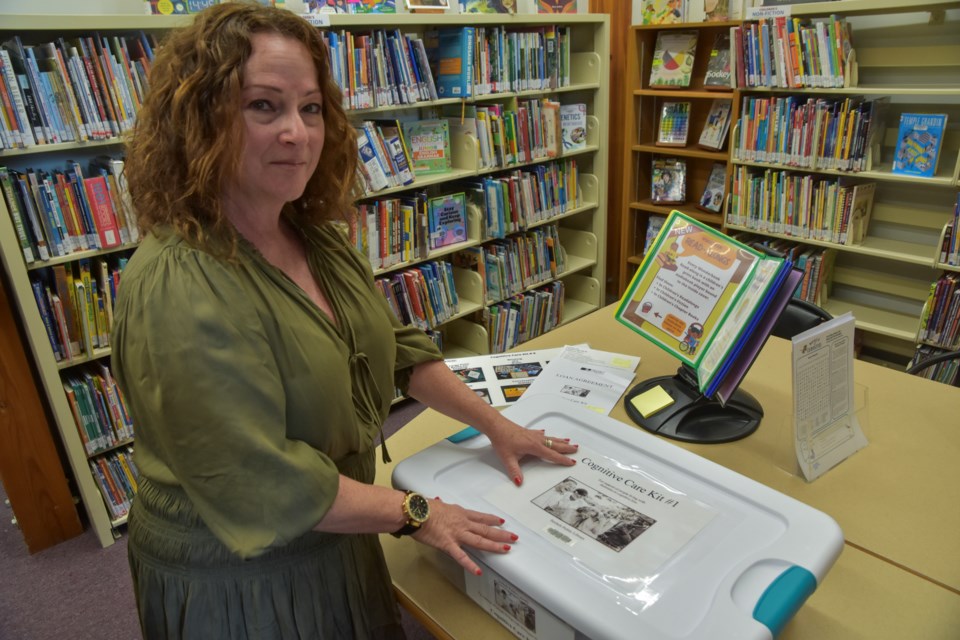Shortly after returning to its regular location, Sechelt Public Library has a new item available for loan, an innovative resource to assist those living with dementia and other forms of cognitive loss.
Leianne Emery, Sechelt Public Library director said libraries are changing, searching to find more services they can provide to their communities.
“To me, the concept is borrowing something that you may not be able to afford or don't want to buy, Emery said. “Not just borrowing books, borrowing other things.”
Cognitive care kits are one of the newer additions to Sechelt Library, along with other items and kits available to borrow such as Seasonal Affective Disorder (SAD) lamps, radon detection kits, science, technology, engineering, arts and math (STEAM) kits for children, iPads, instruments, brain games, e-readers and more.
Space is at a premium in the library, what Emery calls “net zero expansion” so to add something new, something else must be removed, meaning the dedicated team at the library has to get creative when they want to add new features to the space.
From the contents of the kit to the container housing it, every aspect of the cognitive care kits was carefully planned out by library staff, who spent roughly 26 hours alone in processing.
The library offers six distinct cognitive care kits, each with unique contents that fall under the same fundamental categories: large print books, “working the brain” exercises, conversation starters, creative arts, games and puzzles, as well as picture books.
DVDs, fidget toys, word searches and trivia games and much more can be found in each of the cognitive care kits.
Emery and the team at the library designed the kits around the DementiAbility Method of creating environments that support the needs, interests, skills, strengths and abilities of those living with dementia and other forms of cognitive loss.
In researching those living with dementia and other forms of cognitive loss, Emery noted the variety of proficiency and how certain tasks can be much more challenging for some people.
“Depending on who's using this, it could suit a variety of cognitive abilities or cognitive levels,” Emery said. “We wanted a one-stop shopping in the kit.”
All the different activities have been labelled and packaged accordingly within the kit, making it easy to find the activity of choice.
The contents of each kit aren't cheap – each one has $500 to $600 worth of items inside, and thus comes with a number of measures to make sure it all comes back after each loan.
Each kit includes a loan agreement, outlining the loan period (21 days), renewals, returns and replacement fees for all items included in the kit.
While the library doesn’t have late fees for their books, Emery explained they do have late fees when loaning out pieces of technology.
To help keep the many items organized, kits also come with a return checklist which shows each item and its respective contents within the kit and a sheet with all the items in the kit pictured.
The kits help not only those living with forms of cognitive loss but also their family members, Emery said.
“If Ma is sitting at home with Pa and Pa’s losing abilities, some people just don't know what to do or how to do it or how to use something or how to interact properly,“ she said.
Even though the kits are new to the library, Emery says they started hearing positive feedback immediately, which she said has been encouraging.
Emery recalled someone who recently took out one of the cognitive care kits.
“She said, ‘this was the most amazing thing I've ever had,’ she goes, ‘it gave me ideas and things that I could use to talk to the person I was with and conversation points and we had so much fun with this kit.’”
Another recent user said they had so much fun with the kit that they didn’t even get to all the games inside.
“We're not trying to be experts,” Emery said. “We're just doing our best to help somebody who might need the contents of the kit to make their day better.”
Jordan Copp is the Coast Reporter’s civic and Indigenous affairs reporter. This reporting beat is made possible by the Local Journalism Initiative.



